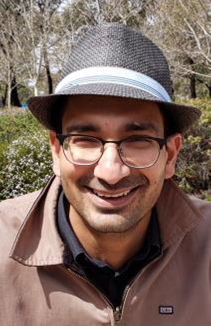Please join us on Thursday 11th June, 2:00pm (AEST) for a talk by Anandaroop Ray
Probabilistic Seismic Full Waveform Inversion (FWI)
Register Now: https://us02web.zoom.us/webinar/register/WN_MBfv_1tRSeuLMq-7PvKI_Q
After registering, you will receive a confirmation email containing information about joining the webinar. Contact secretary@aseg.org.au if you have any questions.
Please bring your own drinks and nibbles.
Probabilistic Seismic Full Waveform Inversion (FWI)
Limited illumination, insufficient offset, noisy data and poor starting models can pose challenges for seismic full waveform inversion (FWI). Appropriately formulated Bayesian approaches can mitigate these problems by appealing to parsimony, i.e., low model dimension, and through rigorous quantification of prior knowledge. Given the flexibility of the Bayesian framework, the theory can include the inference of nuisance parameters such as the source wavelet and data noise. Given the tandem developments in statistical inference and HPC, sampling based approaches to FWI are able to provide a surprising amount of subsurface information. While the non-linearity of wave physics is indeed a significant obstacle for inversion algorithms, it is also the reason why inferences, should we reach the appropriate local minima (or posterior probability maxima), are so much more informative than for diffusive or potential field geophysics. Through a combination of synthetic and real data examples, this talk will attempt to encourage further research in this arena.

Biography:
Anandaroop Ray (“Anand”) started his career as a non-seismic geophysicist with Shell Exploration and Production in 2007. In 2010 he joined the PhD programme in marine electromagnetics at the Scripps Institution of Oceanography in San Diego, California. In 2014 he completed his thesis focusing on uncertainty estimation in electromagnetic inversion for marine hydrocarbon exploration. From 2012-19, he worked for Chevron R&D on various problems – controlled source electromagnetics (CSEM), seismic full waveform inversion (FWI), reservoir properties from seismic (RPFS), airborne electromagnetics (AEM), statistical hydrocarbon exploration lookback analyses, and the role of machine learning in geophysics. The question most asked through his work is “how credibly can we interpret our inversion model(s),” the answering of which often requires the use of high performance computing (HPC) techniques. He currently co-advises a PhD student at Columbia University on Bayesian geophysical inversion, and has been active in convening and organizing the Uncertainty in Geophysical Inversion session at the American Geophysical Union’s Fall Meeting. In March 2019 he joined the Minerals, Energy and Groundwater Division at Geoscience Australia, where he continues to work on inverse uncertainty, model representation and geostatistics.
